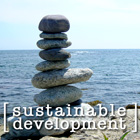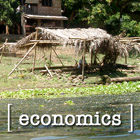
|
THE TIME IS NOW FOR GLOBAL ACTION ON EMISSIONS REDUCTION CRISIS POLICY FORUM PUBLISHED THIS MONTH AN INTRODUCTORY TEXT FOR AN ACTION PLAN TO CURB GLOBAL EMISSIONS & TRANSFER TO GREEN ECONOMY 28 November 2007 :: Crisis Policy Forum Due to the science we already have, the laws we have to govern our own activity and to force government to act for the public health, we face the real possibility of being forced, in American courts, in the future, to pay for damage done to the most affected populations in other parts of the world, as a result of inaction by our government. And if not in court, then as a matter of the de facto urgencies of international political stability. If we do not find a way to work to mitigate global climate change, future generations will look back and will see clearly that a zeitgeist of selfish convenience and primitive disregard for the wellbeing of our fellow human beings led to a reckless attitude with regard to this snowballing crisis. The public voice, and those campaigning for the level of public respect needed for election to office, should bring this issue to the fore, push for real initiatives to tackle the problem boldly, in a collaborative way, now. The IPCC is one of the most comprehensive and prestigious bodies of scientists ever gathered from around the world, and it has been unequivocal in its reports this year. Every major player in world politics, including Pres. Bush, has acknowledged that global climate change is happening, and is the result of human activities. 2007 will be remembered as the year the climate crisis went public and stayed on the global public interest radar, for good. The United States cannot afford to be lagging behind, not now, and not in the eyes of history. For public servants serious enough to work across ideological rifts, a proposal for responsible legislation to deal with this crisis (to be pushed for and initiated in advance of the November 2008 US elections):
Let's think ahead and privilege the "zero emissions" criterion. The more we can do to implement large-scale energy solutions that are in themselves zero-emissions processes, the larger the percentage of current emissions we can do without. It's that simple. A viable, comprehensive action plan for serious global reductions over coming decades requires a collaborative framework wherein:
A combination of military investment, industrial incentivization, market-driven competition, and consumer-friendly implementation strategies, will help the US economy move away from the risks (economic, sanitary and environmental) of the dependence on carbon-based fuels. [Complete Text]
BACKGROUND: Investment in fuel ethanol distilleries has soared since the late-2005 oil price hikes, but data collection in this fast-changing sector has fallen behind. Because of inadequate data collection on the number of new plants under construction, the quantity of grain that will be needed for fuel ethanol distilleries has been vastly understated. Farmers, feeders, food processors, ethanol investors, and grain-importing countries are basing decisions on incomplete data. [Full Story] WORLD’S WATER RESOURCES FACE MOUNTING PRESSURE Global freshwater use tripled during the second half of the twentieth century as population more than doubled and as technological advances let farmers and other water users pump groundwater from greater depths and harness river water with more and larger dams. As global demand soars, pressures on the world’s water resources are straining aquatic systems worldwide. Rivers are running dry, lakes are disappearing, and water tables are dropping. Nearly 70 percent of global water withdrawals from rivers, lakes, and aquifers are used for irrigation, while industry and households account for 20 and 10 percent, respectively. [Full Story] SUPERMARKETS & SERVICE STATIONS NOW COMPETING FOR GRAIN Cars, not people, will claim most of the increase in world grain consumption this year. The U.S. Department of Agriculture projects that world grain use will grow by 20 million tons in 2006. Of this, 14 million tons will be used to produce fuel for cars in the United States, leaving only 6 million tons to satisfy the world’s growing food needs. [Full Story] WORLD GRAIN STOCKS FALL TO 57 DAYS OF CONSUMPTION This year’s world grain harvest is projected to fall short of consumption by 61 million tons, marking the sixth time in the last seven years that production has failed to satisfy demand. As a result of these shortfalls, world carryover stocks at the end of this crop year are projected to drop to 57 days of consumption, the shortest buffer since the 56-day-low in 1972 that triggered a doubling of grain prices. [Full Story] NORWAY TO BUILD ARCTIC SEED BANK The Norwegian government has announced plans to create a global seed bank, to be located in the nation's arctic subsoil, to preserve all world crop varieties against extinction, should any number of natural disasters strike. The seed bank will be located inside a frozen mountain on the island of Spitsbergen, in the Svalbard archipelago in the Arctic Ocean. [Full Story] |
|||||||||||||||||
|
||||||||||||||||||







